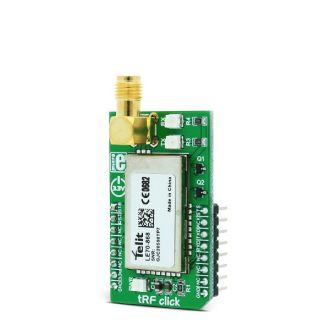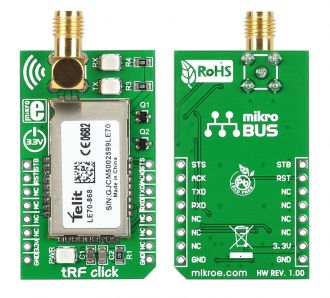
We strongly encourage users to use Package manager for sharing their code on Libstock website, because it boosts your efficiency and leaves the end user with no room for error. [more info]

Rating:
Author: MIKROE
Last Updated: 2018-08-09
Package Version: 1.0.0.1
mikroSDK Library: 1.0.0.0
Category: Sub-1 GHz Transceivers
Downloaded: 9251 times
Followed by: 1 user
License: MIT license
This example demonstrates usage of the tRF click board in mikroBUS form factor. Board features Telit's LE70-868 RF module.
The example will send the text string via the LE70-868 RF module display the received string on the Lcd.
Do you want to subscribe in order to receive notifications regarding "tRF click" changes.
Do you want to unsubscribe in order to stop receiving notifications regarding "tRF click" changes.
Do you want to report abuse regarding "tRF click".


Library Description
Initializes and defines UART bus driver, and defines driver's functions for comunication (reading and writing) between tRF clicks.
Key functions:
void trf_writeByte(uint8_t input) - Function writes (sends) one byte in UART rx bufferuint8_t trf_readByte() - Function reads (receives) one byte from UART rx bufferuint8_t trf_byteReady() - Function checks state of rx buffer (is new data placed in)void trf_reset() - Function resets click and sets back in normal operating modeExample description
The application is composed of three sections:
void applicationTask()
{
char tmp;
uint8_t rdyFlag;
// RECEIVER - UART polling
rdyFlag = trf_byteReady();
if (1 == rdyFlag)
{
tmp = trf_readByte();
mikrobus_logWrite( &tmp, _LOG_BYTE );
}
// TRANSMITER - TX each 2 sec
/*for (tmp = 0; tmp < 9; tmp++)
{
trf_writeByte( MESSAGE_DATA[tmp] );
mikrobus_logWrite( "MESSAGE SENT", _LOG_LINE );
Delay_100ms();
}
Delay_ms(2000);*/
}
Other mikroE Libraries used in the example:
Additional notes and information
Depending on the development board you are using, you may need USB UART click, USB UART 2 click or RS232 click to connect to your PC, for development systems with no UART to USB interface available on the board. The terminal available in all MikroElektronika compilers, or any other terminal application of your choice, can be used to read the message.